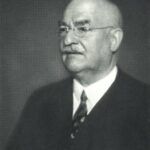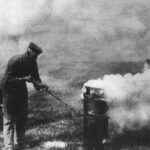April 29, 2015
Annual Stockholders’ Meeting on May 27, 2015
Countermotion: The actions of the members of the Board of Management are not ratified
Bayer Aktiengesellschaft
Kaiser-Wilhelm-Allee 20
51373 Leverkusen, Germany
We hereby notify you that we will oppose the proposals of the Board of Management and the Supervisory Board as regards Items 2 and 3 of the Agenda, and will induce the other stockholders to vote in favor of the following countermotion.
Former BAYER General Director Carl Duisberg shared responsibility in the First World War for the use of poison gas and the deportation of civilians for forced labor. The cities of Dortmund and Lüdenscheid have therefore now rededicated streets previously named after him. In contrast, the BAYER Board of Management is sticking stubbornly to Duisberg‚s tarnished inheritance.
On November 26, 2014, the decision was taken in Dortmund to rename the street called “Carl-Duisberg-Straße.” By way of explanation, the following statement was issued by the Dortmund historical archives: “Duisberg was one of the leading German industrialists, who, during the War, organized the deportation of Belgian civilians to Germany for forced labor – which was even then already illegal under international martial law. (… ) As a patriarch, he disapproved of trade unions up to his death. From the very beginning, he had opposed the Weimar democracy.” Duisberg‘s support of the antisemitic “Pan-German League” is also mentioned in the statement.
On December 8, the city council of Lüdenscheid followed suit and decided to rename the street called “Duisbergweg.” In a statement, the Lüdenscheid historical archives wrote: “During the First World War, under Duisberg‚s chairmanship, poison gas was produced at Bayer for combat use. Waste products from the chemical industry, which was battling with economic difficulties, served as the raw materials. In Leverkusen, this included phosgene, a gas that has dreadful effects.” In Wuppertal, Dormagen, Krefeld, Bonn and Frankfurt, too, initiatives to rename streets named after Duisberg are ongoing.
At the end of the 19th century, Carl Duisberg had already been marketing heroin as an apparently “harmless cough remedy.” When scientists denounced the addictive potential of the product, he said one ought to „muzzle the opponents.” Although the risk of addiction quickly became obvious, BAYER continued to sell heroin over a period of several decades.
In the First World War, Carl Duisberg complained to General Hindenburg and General Ludendorff about the shortage of laborers. With the exhortation “Open up that big reservoir of people that is Belgium,” he called for the forcible enlistment of Belgian workers. The German War Ministry accepted Duisberg‘s proposal and had tens of thousands of Belgians deported in 1916. Several thousand died.
At the same time, Carl Duisberg together with Fritz Haber developed poison gases such as green cross and mustard gas, tested them for the first time on the front line, and vehemently demanded their deployment. In a letter to the Supreme Army Command, Duisberg wrote: “This carbonic dichloride is the cruelest thing I know. ( … ) But the only real place where one can nowadays try out something like this is on the front line, and there is not likely to be such a good opportunity again very soon. ( … ) I can therefore only urgently recommend once again that you do not allow the opportunity presented by this war to pass by without also testing hex-grenades.”
Under Duisberg‚s management, BAYER also became the biggest German producer of explosives. Without the supplies from the chemical industry, the War would have ended after a few months due to a lack of ammunition.
In 1917, Duisberg became a member of the extreme right-wing German Fatherland Party. He also became a member of the Board of the “Independent Committee for German Peace,” a founding of the anti-semitic “Pan-German League.” Duisberg called for the annexation of the occupied regions in Belgium and northern France and, a little later, “German living space” in Poland and Russia. Duisberg had excellent contacts with the Supreme Army Command and involved himself aggressively in the planning of the war aims. He also pushed for unrestricted submarine war and successfully campaigned for the removal of the (apparently too lenient) Chancellor Bethmann-Hollweg.
Duisberg adopted a negative attitude to the Weimar Republic from the very beginning. Duisburg organized donations to nationalistic parties, also – from 1930 at the latest – to the NSDAP. In 1931, Duisberg, who had since become Chairman of the Supervisory Board of IG FARBEN, announced: “The German people are constantly calling for a leader to free them from their unbearable situation. Should a man come along who has proved that he has no inhibitions, then this man must be supported at all costs.”
In return for its vast donations, I.G. Farben received sales guarantees from the National Socialists for synthetic fuel and rubber. No other company subsequently collaborated so closely with the Third Reich. When he went into retirement, Carl Duisberg rejoiced: “I‘m looking forward to my twilight years under our leader Adolf Hitler.”
Even now, BAYER denies Carl Duisberg’s share of responsibility for the War and the dictatorship.

